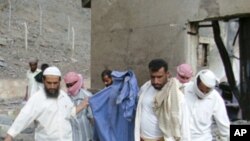Yemeni authorities say explosions have destroyed an ammunition factory as civilians were looting it in the southern province of Abyan, killing at least 110 people and injuring dozens of others.
The blasts happened Monday when residents of the town of Jaar entered the ammunition factory to steal its contents, a day after Islamic militants raided the facility and took over the area. The militants seized ammunition from the factory Sunday before leaving the building.
Yemeni state media blamed the disaster on al-Qaida, saying terrorists who raided the factory had lured civilians into a "trap." Residents said someone may have dropped a cigarette in the building Monday, triggering the explosions and resulting fire. The dead include women and children who were among the looters. Doctors said many of the survivors suffered burns.
Abyan's provincial governor called for an investigation of the incident. State media accused al-Qaida militants of blocking fire trucks and ambulances from reaching the scene.
Security forces had exchanged fire with the Islamist fighters in Jaar on Sunday. One soldier was killed in the fighting.
The unrest in southern Yemen is the latest crisis to face Yemen's weakened President Ali Abdullah Saleh as he tries to deal with an escalating political crisis.
Mr. Saleh has faced weeks of daily mass protests demanding that he step down after 32 years in power. His security forces have engaged in deadly confrontations with opposition activists while also fighting al-Qaida militants who have used lawless parts of Yemen to plot and carry out attacks on the government and the West.
The Yemeni president has cooperated with the United States in the battle against al-Qaida.
Mr. Saleh declared Sunday that he will make "no more concessions" to opposition groups whom he said are bent on eradicating his presidency and ruling party rather than engaging in democratic elections. Yemeni opposition groups have rejected previous offers by Mr. Saleh to stand down before the end of his term in 2013, insisting on his immediate departure.
U.N. Under-Secretary General for Humanitarian Affairs Valerie Amos expressed serious concern about a deteriorating humanitarian situation in Yemen, saying the country faces "acute water and food shortages." In a statement Monday, she said 31.5 percent of Yemen's population is "food insecure."
Amos said aid workers in Yemen lack the capacity to respond to the shortages because insecurity has forced some humanitarian agencies to relocate staff out of affected areas.
Some information for this report was provided by AP, AFP and Reuters.




